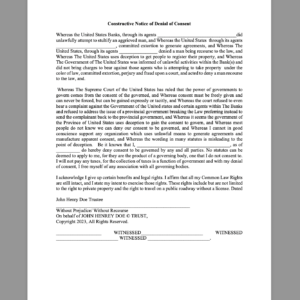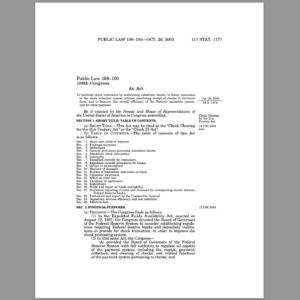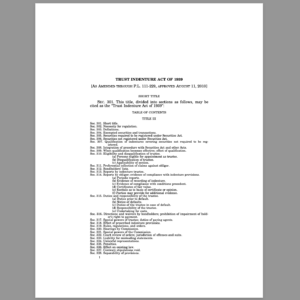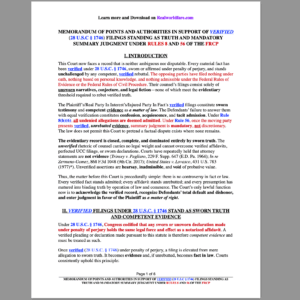Recently, we had a situation with a bank claiming that the surety’s right of equitable subrogation was not superior to the bank’s purported security interest under the Uniform Commercial Code (the “UCC”) and that “modern” authorities suggest that the UCC has supplanted subrogation. After I laughed at the bank’s counsel on the phone, I then went back to find the support to make sure that I was correct.
First, let’s take a quick look at the surety’s right of equitable subrogation. The doctrine of equitable subrogation involves the equitable principle that when one who is secondarily liable has paid the debt of another, who is primarily liable, the secondarily liable party will, in equity, be substituted to all the rights and remedies of the creditor against the primarily obligated party whose share of the joint liability the secondarily liable party has been compelled to discharge. The doctrine is not dependent upon contract, nor upon privity between the parties; it is a creature of equity, and is founded upon principles of natural justice. Centreville Car Care, Inc. v. North Am. Mortgage, 559 S.E.2d 870, 872 (Va. 2002). Thus, equitable subrogation arises by operation of law. XL Specialty Ins. Co. v. Com., Dep’t of Transp., 611 S.E.2d 356, 360 (Va. 2005). The rationale of subrogation is bottomed on a sensitivity to the comparative equities involved. Where one is more fundamentally liable for a debt which another is obligated to pay, such person shall not enrich himself by escaping his obligation.
Upon default of the principal, the surety, which has obligations under the bonds, steps into the shoes of the principal, the obligee and other creditors whom the surety satisfies. The surety is subrogated not only to the right of the obligee to pay laborers and materialmen from funds retained out of progress payments, but also to the obligee’s right to apply to the cost of completion the earned but unpaid progress payments in its hands at the time of default. A surety has rights to the retained funds that are distinct from, and greater than, those of the principal. As the Court in National Shawmut Bank noted, a contract bond surety is “secured” not by collateral per se, but rather by the “opportunity, on default, to finish the job and apply any available funds against its cost of completion.” National Shawmut Bank of Boston v. New Amsterdam Cas. Co., 411 F.2d 843, 845-46 (1st Cir. 1969). The reasoning that underlies such a result is that, but for the acts of the surety to pay materialmen and laborers and complete the project, none of the contract funds would have ever been owing to the defaulting principal (there is no debt due to the contractor to which an assignee’s security interest may attach).
Importantly, a surety’s subrogation rights relate back to the date the surety issued the bonds on the underlying contract. See In re Jones Construction & Renovation, Inc. 337 B.R. 579, 583 (Bankr. E.D. Va. 2006) (“[T]his right [to retained funds] relates back to the date of the surety’s issuance of bonds for the contract.”); Western Casualty and Surety Co. v. Brooks, 362 F.2d 486, 489– 90 (4th Cir. 1966) (“[S]ince this ‘equitable right’ of the surety to the fund relates back to the date of the surety bond, it entitles the surety to priority in payment over all subsequent lienholders and general creditors.”).
In light of the nature and purpose of the doctrine of equitable subrogation, the great weight of decisional authority holds that the surety’s rights of equitable subrogation are not subject to the UCC. Thus, there is no need to file a UCC-1 or comply with Article 9 in order to perfect your rights to equitable subrogation. See In re Modular Structures, Inc., 27 F.3d 72, 79 at n. 7 (3rd Cir. 1994)(“the overwhelming and essentially unanimous post UCC decisions in … federal as well as state courts have held that … no UCC filing is necessary to perfect the surety’s interest”); Employers Ins. of Wausau v. St. Clair Contractors, Inc., No. CV-01-629-S-BLW, 2007 WL 4299843, at *1 (D. Idaho Dec. 4, 2007)(“[a]rticle Nine does not apply to the equitable lien of a surety”); In re Alcon Demolition, Inc., 204 B.R. 440, 447 (Bankr. D.N.J. 1997)(“[i]n fact, equitable subrogation rights are superior in priority to perfected bank liens, even in the absence of U.C.C. filing”); In re J. V. Gleason Co., 452 F.2d 1219 (8th Cir. 1971)(“[t]he courts have held that the UCC covers consensual security agreements only, not those arising by operation of law. Thus, the surety need not conform to the filing requirements of Article 9 to enforce its equitable right of subrogation”); National Shawmut Bank of Boston, 411 F.2d at 845-46; First Alabama Bank v. Hartford Accident & Ins. Co., 430 F.Supp. 907 (N.D.Ala. 1977); McAtee v. United States Fidelity & Guar. Co., 401 F.Supp. 11 (N.D.Fla. 1975); Home Indem. Co. v. United States, 433 F.2d 764, 765 (Ct. Cl. 1970)(“[w]e agree that the U.C.C. was not intended to, and did not, alter the preexisting law as to a surety’s rights of subrogation.”); Fin. Co. of Am. v. U.S. Fid. & Guar. Co., 277 Md. 177, 183-84, 353 A.2d 249, 253 (1976)(“[t]hat the surety need not file a financing statement under §9-302 of the UCC to protect its subrogation rights is clear.”); United States Fidelity & Guaranty Co. v. First State Bank of Salina, 208 Kan. 738, 494 P.2d 1149 (1972); National Surety Corp. v. State Nat. Bank of Frankfort, 454 S.W.2d 354 (Ky.1970); Mid-Continent Casualty Co. v. First National Bank & Trust Co., 531 P.2d 1370 (Okl.1975); Jacobs v. Northeastern Corp., 416 Pa. 417, 206 A.2d 49, 11 A.L.R.3d 1220 (1965); First State Bank v. Reorganized School Dist., R-3, Bunker, 495 S.W.2d 471 (Mo.App.1973); Stevelee Factors, Inc. v. State, 136 N.J.Super. 461, 346 A.2d 624 (1975); Aetna Casualty & Surety Co. v. Perrotta, 62 Misc.2d 252, 308 N.Y.S.2d 613 (1970).
In addition to the case law, the terms of the UCC make it clear that the UCC was not intended to replace equitable subrogation rights. Under section 1-103, the UCC expressly states that it does not displace the particular provisions of the principles of law in equity, which are deemed to supplement the UCC. Thus, the contemplation under the UCC is not that the UCC has done away with equitable rights, but rather those rights continue to supplement the UCC. Indeed, there is nothing in the UCC that expressly or explicitly rejects subrogation. Section 9-109 regarding the general scope of Title 9 provides that the Title applies to a transaction regardless of its form that creates a security interest in personal property or fixtures by contract. As noted in the case law, equitable subrogation arises by equitable principles through the operation of law, it is not a right that arises by contract.
Therefore, equitable subrogation is not something that would fall under the scope of Title 9. In addition, Section 9-109(b)(6) of the UCC may provide further support for this issue, but I have been unable to find any cases that interpret this Section. Section 9-109(b)(6) excludes various transactions from the application of Article 9, and among the exclusions is a provision for an assignment of a right to payment under a contract to an assignee that is also obligated to perform under the contract. I think an argument could be made that a surety might be able to use that Section as a basis for arguing that Title 9 does not apply if you get into that situation. So, I think the issue is pretty clear, equitable subrogation is not subject to the requirements of the UCC.
If you have questions regarding the issues discussed in this post, please do not hesitate to contact Michael A. Stover, Esq. (410-659-1321/mstover@wcslaw.com)
this article was sourced from Wright, Constable & Skeen.











